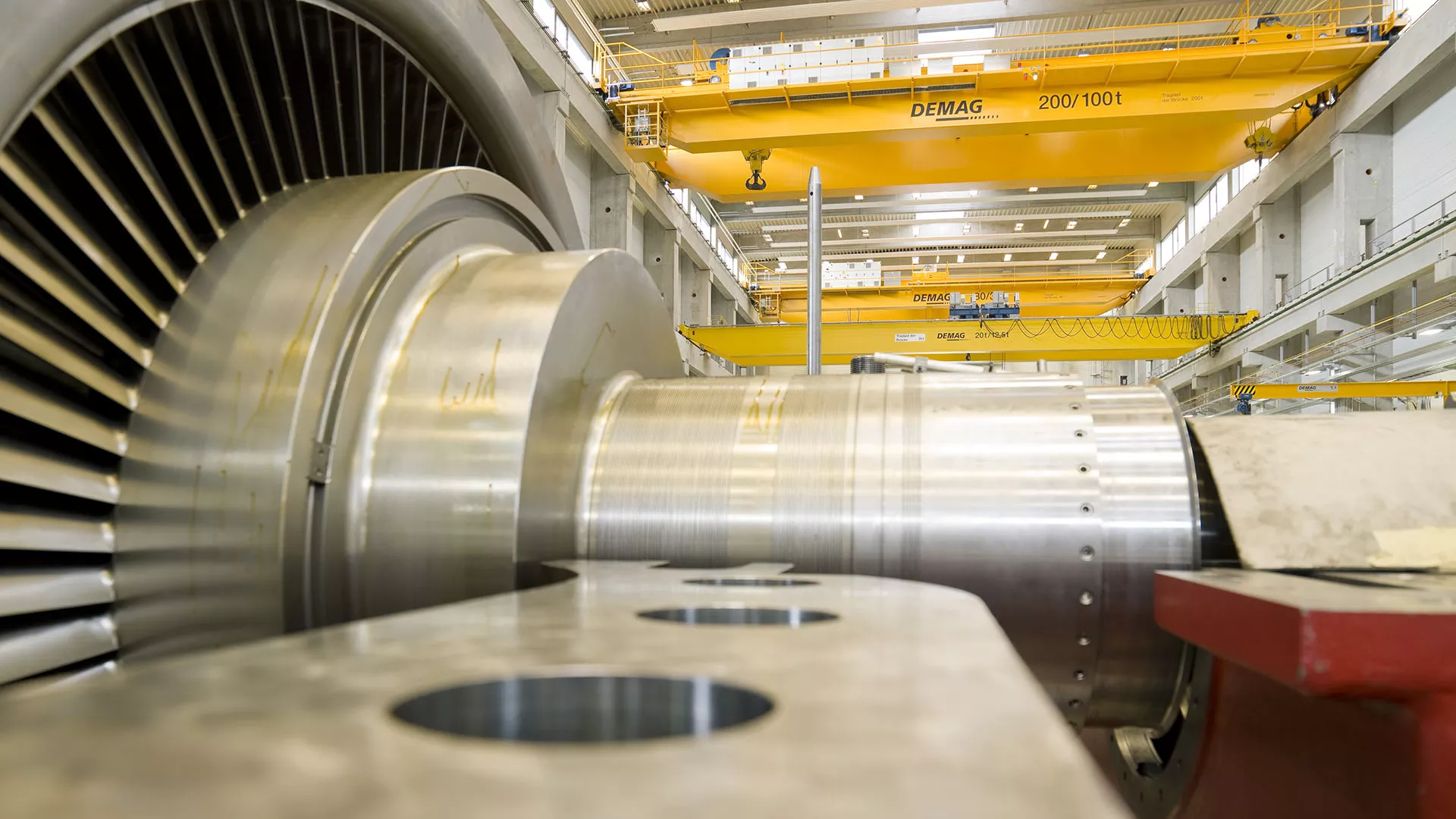
Integrated logistics concept
Siemens Görlitz
Versatile materials handling on three levels
Perfect turbine handling boosts production volume
With crane installations that are specially designed to meet requirements for heavy lifting, workplace logistics and handling parts during assembly, Siemens and Demag Cranes & Components have raised industrial turbine production to a new level. To be precise, to three new levels
- Level 1: Two process cranes for steel handling
- Level 2: Three universal cranes for transporting materials
- Level 3: Seven wall-mounted slewing jib cranes at the assembly workstations
Siemens in Görlitz
Specialist for industrial steam turbines
Siemens AG is divided into three sectors – Industry, Energy and Healthcare – with a total of 15 divisions. The Energy sector is the world’s leading supplier of a wide range of products, services and solutions for power generation, transmission and distribution, as well as for the production, conversion and transport of oil and gas. Its customers are primarily energy utilities, but also industrial companies – particularly those in the oil and gas industry.
The Görlitz location belongs to the Oil & Gas Division of the Siemens Energy Sector and is the headquarters of its Industrial Steam Turbines business unit. The plant in Saxony is one of seven locations worldwide which manufactures industrial steam turbines. They are mainly used to generate power in combined heat and power plants, cogeneration plants or smaller gas and steam turbine facilities. In addition, steam turbines are also employed in sugar and pulp factories, in the chemical industry as well as in solar power plants.
Turbine production with 3 crane levels
Productivity raised to a new level
The first logistics challenges were already defined during the project phase: the new building, commissioning and all of the interior work including installation of the Demag crane systems had to be completed within a period of just nine months. This was a schedule for which we offered the optimum solution: an integrated intralogistics concept from a single source. From assembly to the parts delivery operation and heavy load handling, Demag crane installations provide an overhead material flow solution on three levels to each of the 20 assembly stations.
Level for handling heavy loads
Two process cranes, which are engineered to meet the needs of the specific application and are each fitted with two rope hoists, provide for process reliability as well as maximum safety and availability on the upper crane level. Individual components such as base frames, turbine housings and fully assembled rotors that weigh between 40 and 70 t are handled by the process crane, which has a rated load capacity of 80/32 t.
The second process crane, which has a capacity of 200/100 t, is responsible for transporting turbine packages weighing up to 190 t to the goods-out area when they are ready for shipping. This process crane also performs further functions:
- Safe turning: an important step in production requires the turbines to be turned 180° into the opposite assembly position. In the past, this operation was performed with the help of a mobile crane. The process crane now completes this task quickly and efficiently.
- Exact weighing: load detectors are integrated into the bottom blocks.
By means of summation functions, any deviations from the expected weight can be detected early on, thus enabling the previously issued travel permit to be updated, if required.
Material flow level
Three standard overhead traveling cranes of double-girder design with load capacities of 20/12.5 t and 32/16 t are used to replenish the 20 assembly stations with components. The cranes are equipped with radio control and particularly compact DR-Pro traveling rope hoists, which enable valuable additional lifting height to be achieved.
Assembly at workplaces
Wall-mounted slewing jibs at the assembly stations complete the overhead material flow system. Since they are mounted on columns in the building, the cranes do not take up any valuable floor space. They assist the workers in the assembly process with optimum handling of parts weighing up to 1,000 kg. The 5 m-long jibs can be manually slewed through 180° and are fitted with DC-Pro traveling chain hoists, which can be conveniently operated by means of DST control pendants.
Added value – at a glance
Achieving demanding targets
More turbines. Greater reliability. Improved production efficiency.
Our integrated intralogistics solution helps Siemens at its Görlitz location to achieve its targets:
- Process improvement
- Cost reduction
- Availability
- Supply reliability
- Delivery performance
Greater sensitivity for precise control
Exact positioning of heavy loads is the key to safe and efficient production. The two process cranes meet this requirement with maximum precision. Inverter-controlled motions and load-dependent lifting speeds facilitate precise handling and exact positioning – right down to the last millimeter.
Simplifying processes
The shrink-fitting of so-called live steam inserts requires the turbines housings to be turned 180° into the opposite assembly position. In the past, this operation was performed with a mobile crane. With the new process crane, the turning operation can be carried out easier, faster and without the need for any additional space. Two crabs that are designed for safely turning the workpieces reliably hold the turbine housing in any position.
More useful space
The entire overhead material flow system utilizes the available building space to the full.
Particularly effective are the wall-mounted slewing jib cranes, which support the workers in the pre-assembly of sub-assemblies. Since they are mounted on columns in the building, the wall-mounted slewing jib cranes do not take up any floor space and, therefore, save valuable space that can be used for the assembly work.
Technical data
Integrated logistics concept for turbine assembly
| Crane type1) | Hoist units [t] |
Span dimension [mm] |
Max. speeds (variable) [m/min] |
|||||||
| Load capacity | Crane | Traveling hoist | Main lifting | Auxiliary lifting | ||||||
| V2) | T2) | V2) | T2) | |||||||
| Level 1: Process cranes for handling heavy loads (height of 16 m) | ||||||||||
| ZKKW | 200 | 100 | 24,000 | 40 | 20 | 2.1 | 3.3 | 3.1 | 5 | |
| ZKKW | 80 | 32 | 24,000 | 40 | 20 | 2.7 | 4.4 | 5.4 | 8 | |
| Level 2 : Standard cranes for transporting materials (height of 10 m) | ||||||||||
| ZKKE | 32 | 16 | 23,100 | 40 | 5-25 | 0.3-5.3 | 0.5-5 | |||
| EKKE | 20 | 12.5 | 23,100 | 40 | 5-25 | 0.3-8 | 0.5-8 | |||
| Level 3: Slewing cranes at the assembly stations (height of 5 m) | ||||||||||
| WSK | 1 | 5,000 | - | man. | ||||||
1) ZKKW: process crane with MPW multi-purpose open winch units
ZKKE: standard double-girder overhead traveling crane with DR-Pro rope hoists
WSK: wall-mounted slewing jib crane with I-beam girder
2) V= full load, T= partial load
3) Jib length













